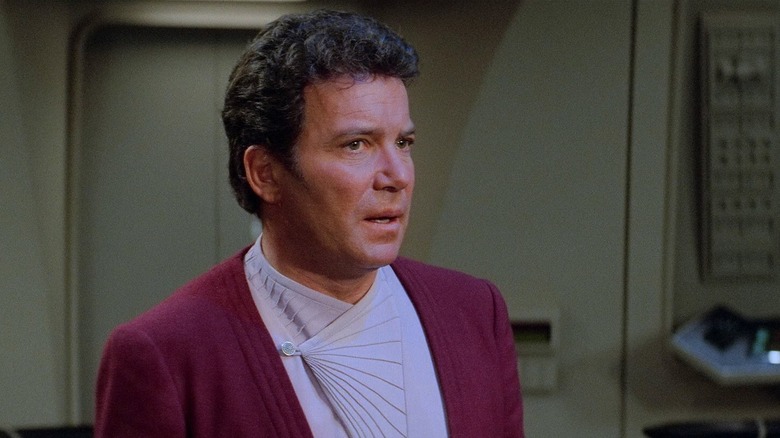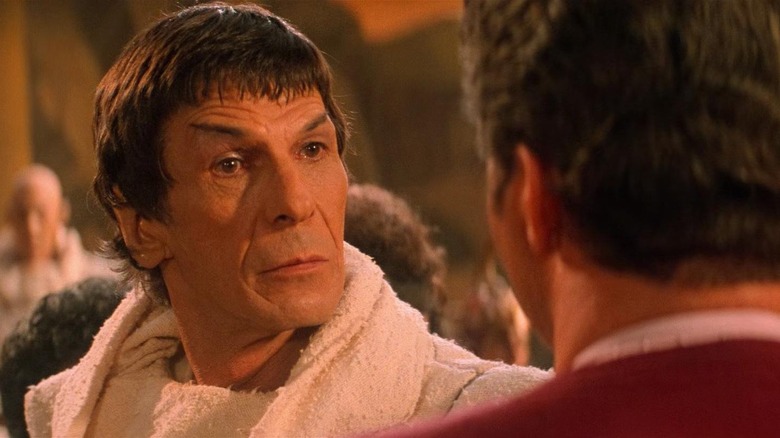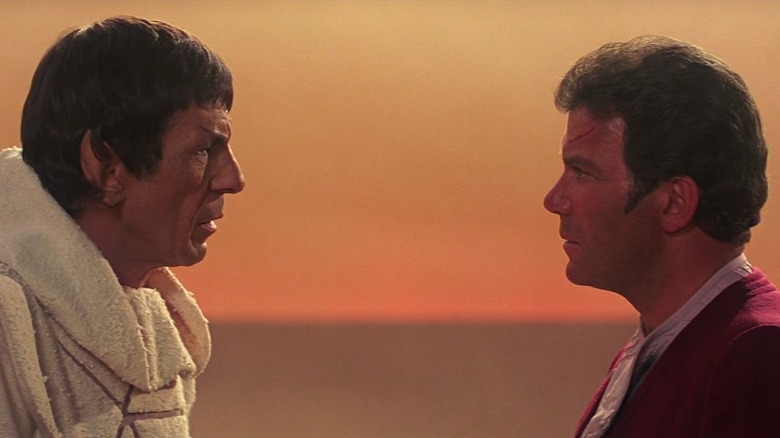Leonard Nimoy's Directing Made Star Trek III An 'Awkward' Film For William Shatner
"Star Trek III: The Search for Spock" is not everyone's favorite movie in the franchise, but it is an important one. Not only did it revive Spock after the events of the much-beloved "Wrath of Khan," but it also was an important first as Leonard Nimoy stepped behind the camera to direct the film as well. Before that, Nimoy had only directed select episodes of TV shows like "Night Gallery." But this was his feature directorial debut, and fittingly, it was within the franchise that made him famous. However, it did create a bit of awkward tension with his friend and co-star, William Shatner, who had starred as Captain Kirk since the beginning of the original series.
Nimoy and Shatner had worked together for nearly 20 years by the time the 1984 film rolled around. But with Nimoy behind the camera, the power dynamic was about to change in a meaningful way. Speaking in Edward Cross and Mark A. Altman's 1995 book "Captain's Log: The Unauthorized Complete Trek Voyages," Shatner explained why the situation was a bit uncomfortable for him — at least at first.
"Leonard and I are the dearest of old friends. We had shared a mutual struggle with the management in various stages, whether it was a script, a thought, a concept or a dressing room and ask each other what we thought. We'd have a plan! Whenever we were to deal with management, we'd plan it out together. Now, suddenly, my 'brother' was saying, 'Well, you should do this and I think you should do that.' There was an awkward period of time for me, although I don't think for Leonard, where I felt alone in anything I might have objected to. From my point of view, it was more awkward in the beginning than with either of the other two directors [Robert Wise and Nicholas Meyer]. But that slowly erased itself."
'I must be really naive about this'
There is certainly going to be a change in the power dynamic when an actor who was previously acting alongside the lead in the franchise suddenly steps into the director's chair. That gave Nimoy a great deal of say over where the story was headed and how it was executed. Even so, Nimoy didn't initially believe that taking over as the film's director would be of concern to his fellow castmates.
"I must be really naive about this. I really must. I was surprised that there was so much interest and so much concern about that. The interests and concerns are valid. I just didn't perceive the potential problems or friction that other people perceive. My fellow actors were concerned about it before we started doing the picture. I simply took it as fact that I had their best interests at heart. That I would know their characters well, and I certainly knew their potential well and would try to explore it. That was one of the things I argued in that period of time when I was asking for the job."
Nimoy's passion is hard to argue with. He had to fight Paramount to get the job, and then he had to fight against some awkward tension with some of his closest friends. Even so, he wanted to assert himself as a creative behind the camera as well. And that was a worthwhile endeavor, as he would go on to direct the massive hit "Three Men and a Baby," as well as several other films during his impressive career. But he knew that launching that career within this franchise was the way to go.
'I know more about Star Trek than either of them'
For Nimoy, it was important for him to have some say in the future of his career beyond "Star Trek." As he saw it, directing was a great avenue to explore. He also firmly believed that he was the right man for the job, and he had a pretty valid point on that front.
"For many years, my concern has been to try to build a career outside of Star Trek so that it wasn't that single straight line of only Trek-oriented work. So there was nothing for us to discuss. I said to Gary Nardino — I was being arrogant — with all due respect to Bob Wise, who directed the first picture, a top notch filmmaker; and all due respect to Nick Meyer, an extremely talented writer/director who directed Trek II; I know more about Star Trek than either of them and I said I could direct Star Trek III successfully. When I first presented the idea of my directing to Paramount, the response was very good but there were certain trepidations. We had to talk them through."
Eventually, the brass at the studio relented and Nimoy directed "Star Trek III." It went quite well and led to Nimoy also directing "Star Trek IV: The Voyage Home," which is widely regarded as one of the best movies in the franchise. It's fair to say it all worked out for the best, despite any reservations Shatner or anyone else in the cast may have had at first.


